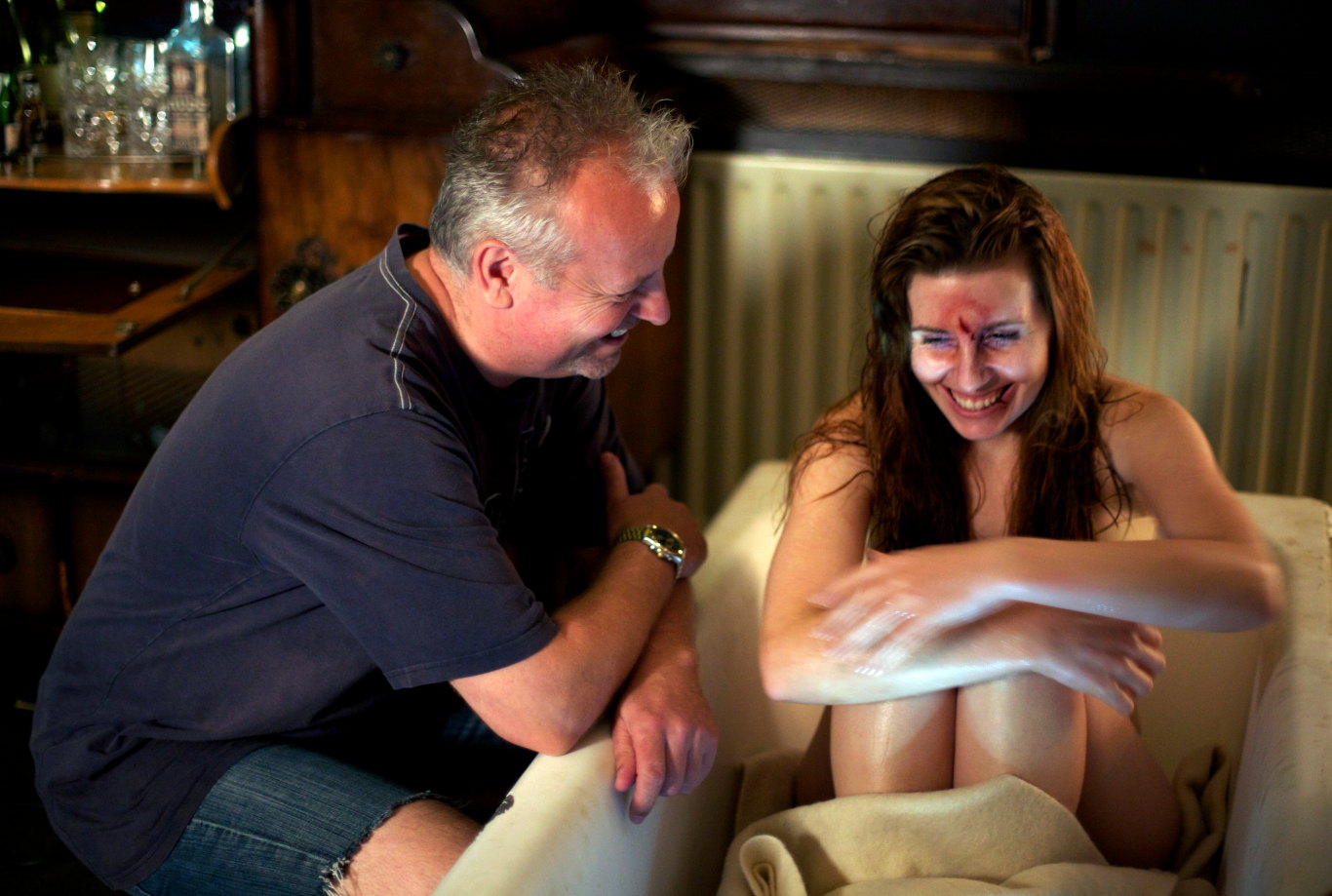ASK & DISCUSS
INDEXWritten a feature script. What's my next step to get it made?
10 years ago - Kevin Haworth
I'm aware this is showing my ignorance on the subject, but I honestly have no idea where to go next.
I've written a feature film script, that I'm finally happy with at this stage. It's been drafted several times and now that I've got it to a stage where it feels finished, I've got no idea what to do next to get it made. Do I try get a producer involved? Start making my own arrangements?
Any help would be greatly appreciated. Thanks.
Only members can post or respond to topics. LOGIN
Not a member of SP? JOIN or FIND OUT MORE
10 years ago - Stuart Wright
Shouldn't this thread just periodically reappear on bulletins ... So much advice and contrary advice. I wonder what the original poster thinks? Throw the towel in? Lolz
10 years ago - Alève Mine
Dan, thanks. actually I forgot:
4) would you trust a stranger on an online platform with the next 5-10 years of your life because they have points? I wouldn't. In the end, it is not the scoring process that you will be working with, it's with (the material that is proposed and, in my case at least,) the person behind it.
5) Unlike what they say in their latest video, originality is not mined appropriately. I wrote to them about that during the mentioned discussion, explaining how they could do it, quite some time before that video.
It so happens that I am in fact a full-on nerd, graduated from something like the MIT of Switzerland, active in the hightech startup area (especially now actually) with a project, so if that's a license to be trusted, then trust me: scoring is merely scoring. It doesn't tell you about how work with those guys will be (And next thing you know, the site starts applying algorithms from dating websites to film funding, if they haven't done that already.), nor really how relevant the film will be in the future when it gets released (see below: the process limits itself) (and next thing you know they start working on predicting trends, if they haven't done that already). Have you ever experienced that there is a software update and they ask you to tick the box that you agree with the neverending text you have no choice but to agree with? Imagine that that text decides of future films, except you can't read it – not that you can for software updates either.
Getting funded is really the biggest success factor, so no wonder that projects that get picked up often seem to be winners. Investors may be able to count on something like that, we can't. Basing future projects on the past projects also remains disturbing. The process limits itself. As a hardcore nerd, I have been thinking A LOT about that kind of stuff (and by the way you're likely to come to that conclusion if you read my action film, which has a tech setting, or my scifi).
Clooney: exactly, that's why you won't get the required visibility on that website either. Risk management: of course. That is why one shouldn't fund your own movies, nor your own startups. But that's nothing unique to that website in the industry.
Piracy? You mean plagiarism? How do they solve that? Actually, production houses send you to get an agent first, who in turn send you to get another agent first, because nobody knows what to do with that. Unless they know you personally inside out. Got a solution? Let me know. I usually send a longish list of proofs that I'm the originator.
This online offer doesn't give US more access. It is there to skim the global market of screenplay-to-production investment. Fair enough.
It's not even a rant. Just observing.
Actually yes it is a rant. But above all I like to help people see things clearly when I get a chance.
10 years ago - Dan Selakovich
Solid advice, Wozy. You win! It reminded me of so many writers I've know that send their script to the wrong place. You have to look into what a company is doing, and match the genre of your story to that company. It really pisses them off to get material they'd never do. You don't want to send SAW 6 to Killer Films, for example.
Aleve, you are absolutely missing my point. It's not about algorithms. It's what system an investor trusts. Even if that system is completely wrong. A lot of people think piracy isn't a problem. But you know what? Investors think it's a problem. So it's irrelevant what you or I think about piracy if you're trying to convince somebody to give you 6 million bucks. Torrents created a cold snap in film investing like I've never seen. Until Slated came along, I really though the midrange budgeted films were long gone. They are pushing that space that studios abandoned.
10 years ago - Nick Goundry
In response to Vasco, I think serious writers should always look for professional feedback as an integral part of improving their work. If they haven't, I would ask why not. If you're afraid of being conned, do your research and find a reputable place to go (there are lots of reputable people). If you're still trying to get into the industry and you don't think your script needs completely objective feedback, then people will question how serious you are about becoming a career writer because the script will always be in constant flux.
Budding writers actually use script readers all the time in order to become produced in the first place. It's a crucial way to find out how the industry will view your script and a good way of someone telling you objectively what the industry (and audiences) probably won't respond to.
I was recently on a writing course where students didn't like script reports simply because they were being advised their scripts needed changes. I spent months last year labouring on a feature screenplay. I got a script report and consultancy session as part of a longer writing course from a hugely experienced script editor who totally changed my opinion of the state of my story. He advised me on how to rewrite it to improve the story structure and help it find an audience. There's lots of information available for free, but professional feedback can also be very useful.
Just remember you won't necessarily sell your script just because you followed a script report that opened your eyes about the changes you need. But it'll always be useful.
10 years ago - Vasco de Sousa
Don't pay for "professional feedback." It's a waste of money (unless you're a producer), and I don't know of any produced screenwriter who uses it. Ever.
Another scam is anyone who says you need "skin in the game."
Read. Read biographies, read articles, read books and watch the extra features in microbudget films. See what other produced screenwriters have done. Start with films you admire, sometimes their stories are in the introductions to their published screenplays.
The internet is full of con artists when it comes to film.
If you want an online starting point, there's the FutureLearn "Business of film" course going on right now, which provides an introduction (but some of the comments are written by con artists.) Future learn also has an NFTS class available that might be useful if you're a total newbie.
I also wrote some reviews of a few courses I've taken, which provide decent introductions. This knowledge will help you to avoid scams.
http://ptara.co.uk/en/2015/10/10/best-free-ways-to-learn-about-the-film-business-online/
10 years ago - Ivan Francis Clements
Like I recommend to everyone who want to make their own film - webfilmschool.com - I get nothing from this recommendation. Good luck.
10 years ago - Alève Mine
Dan I must react to this. I've registered and just before posting the projects, looked into the details. And had a tough discussion with them. From what I understand:
1) yes, slated will cost a lot. For that price make a short where you can pay your cast and crew. That'll be of more use for the purpose of getting a feature done after that.
2) if you don't have name cast or name producer or maybe name director attached already, even if you paid for the project to be evaluated, you are unlikely to get enough points for the right eyeballs to see your project. But if you do have such names attached, you may as well look outside of the platform. Not every potential producer will want the project to be listed there.
3) once you upload anything, you can't remove it from their platform, merely remove its visibility.
10 years ago - Dan Selakovich
You might try "Slated.com". It will cost you, but it's a really good platform for getting scripts and money to see one another. There are lots of youtube videos put out by slated explaining what they do and the industry at large.
https://www.youtube.com/user/Filmonomics
10 years ago - Dan Selakovich
Yep, all true, Aleve. Especially the farther into development you are, the better. A star attached, for example, will up the point system they use. And, yes, looking outside their system might be a better way to go, but I don't think so. Over the years, I've been attached to at least 20 projects. Good scripts and good actors. None of them got to production. Some came really close, but never produced. So you have to ask yourself why that is. They fell apart for many reasons, but in the end, only one reason was left standing: trust. Did the investors trust that this was a good thing they could make money on?
The investors that are attached to Slated trust the process. They trust the Slated points system. They trust the Silicon Valley nerds that developed the system because they've rated just about every movie ever made with their system. Yes, it's expensive, but raising money is expensive. It really is. Slated does seem to pick winners, and investors love that.
Now, if you can go to Cannes and meet a money guy and say I have George Clooney attached, they'll say; "OK, I'll give you 6 million." But you need 12 million because you have George Clooney. And it requires a lot of connections to get into that room with the money guys. Slated is its own connected beast. It will say, "12 million isn't enough. If you spend 15 million, the odds of success are much better." And your odds of getting 15 million through slated is better than going it alone and getting 12. And for the investor, Slated isn't a one off. As I understand it, Slated spreads the risk over several films, not just that one producer begging for cash.
And I know I beat this horse a lot, but piracy scares the living shit out of investors. The days of getting 20 dentists to invest in a film are long gone. What Slated does it grant you access. Something that is incredibly hard to come by in the new digital world where everybody is making a movie or at least writing a script. The reality that Kevin has to face, is in 2014 there were an estimated 100,000 spec scripts written. Only 65 of those sold. I don't know how many were produced, but probably around 6.
10 years ago - Barry Staff
Whatever you do, you're going to need a bit of seed money to promote your project.
With Blue Cat comp. (what, $40?) you used to get two bits of feedback for the cost of the sub; now it's down to one.
Pitching to professionals is invaluable: find a hub around where you are.
Raindance does a 'cheap' pitching session a couple of times a year - half a dozen industry professionals on the panel, a max two-minute pitch gets to the nub of your story's uniqueness.
London Screenwriters' Festival gives you half a dozen face-to-face meetings with producers, plus the chance to join a pitchfest before a live audience, and the opportunity of a half hour session with experts (not to mention all the induction courses going on).
To pursue any of these avenues, put together a good one-sheet, including maybe max 400-word synopsis.
Add a good logline of no more than 25 words (not to be confused with a tagline). This is so tough to do but (along with a solid thematic premise) invaluable, as it gets you thinking about the essential dynamics of your story. And it's not just for hi-concept material; it is capable of great complexity and subtly with a more contemplative movie.
As you'e saving up to do any or all of the above, start another script. That way you might get an agent, as they don't want just one-hit wonders.
10 years ago - Alève Mine
Wowzy again! Seriously. What I attempted to communicate is that we should not be made to believe that they currently change our position in the industry, or we'd at best waste money on them. And yes I gave them a concrete suggestion regarding what to tackle with algorithms, because I am, with all due respect, actually qualified for that part. That said we do tend to read a few words in a post and think we got the message right, so no worries. It happens to me, too.
I've recently sent an email to two people at once - for sponsoring - spelling BOTH names wrong. It takes skill.
10 years ago - Dan Selakovich
Sure, I get your rant, Aleve. And don't disagree with it in a perfect world. But, what Slated does is exactly what Hollywood has been doing since the 60s. They are just better at the analytics than Hollywood is (everything is judged on past performance here). If I had a solid script and some cash, I'd try it the old fashioned way first. But if that didn't work, and it probably wouldn't, I'd certainly give Slated a shot. BTW, a 5 year funding cycle is nothing. Nothing for a spec script. Hell, even studio run hired writers are lucky to have a film go through development hell that fast. I'd wager that Slated is faster than Hollywood all script packages being equal.
10 years ago - Paddy Robinson-Griffin
A film needs a producer, a producer raises money and organises the production. For your first script, this is likely to be you. If you have money or can find some, you can advertise for a 'line producer' (or production manager, very similar roles) who will (for a fee) help you to spend your money effectively and get your film made.
You may also sell the script - send it to all the studios, but first scripts are hard to sell, because they usually need a lot of rework, and there is an oversupply of scripts. You may get lucky, though, and get read and maybe bought! The rework is often because 'the car explodes' is cheap when words on paper, but is a day of shooting and a lot of prep for the unit! You can also try posting to the script pitch bulletin on this site, see if you generate any interest.
Feature films are EXPENSIVE to make, much more expensive per minute than shorts, partly because they need to have all the paperwork in place in order to be saleable, and partly because you can't rely on 2-day favours when you need 4 weeks of work from crew. Just a heads-up :-)
10 years ago - Alève Mine
Paddy if 6 out of 100000 projects get produced, that is by far the greatest factor, even if very few of those 6 are critical or commercial successes.
I can't afford Cannes. Last time I went, I wasn't able to buy the trip out of there. Same for Berlin. Took me a month to find a way out. Not that would have had another place to stay anymore either.
10 years ago - Paddy Robinson-Griffin
Getting funded isn't that great a success factor! Sure, all successful films were funded, but so were a shitton (or shittonne in metric) of other films which flopped way before they ever reached a screen! Treat yourself to Cannes this year, go as a producer, see the market in action - it's scary how many truly bloody awful films are for sale each year (I've made one or two of them...). Straight to DVD in Turkey (dubbed) kind of films... :-$
10 years ago - Alève Mine
Dan, as I tried to clarify with Wozy: I'm just trying to help. You/us AND Slated. I don't have any stakes in this. Which brings us to: why did I ever try?
This is a very busy week for me. I'll have to skip a full response for this reason. But I'd love to read which process is getting more midrange projects produced. Not to argue with anything. Just to learn.
10 years ago - Lee 'Wozy' Warren
Oh my!
I've gotta say that I always hear the unproduced writer or the unproduced director or the unproduced producer etc... arguing against industry standards and norms like they know better. Makes me laugh somewhat. But in all honesty, we all know that somethings should and could be done differently. Sure. But the fact of the matter is they aren't and probably won't be. No matter how loud you shout!
Part of being a writer or director or producer or whatever else your dream or talent may be, part of being in this business means understanding what works and what doesn't. Get into the system first, then tell the world what needs to change. Not sit on the sidelines and cry about why you can't get in...
I've had conversations with some of my learned peers on here about the state of attitudes and how they are changing for the worse. Everyones a fucking expert now because they made a short for £150. Well that maybe fine in their little world, but in the 'business' it doesn't work like that.
Film is a business. You have to understand the rules of the business in order to get in, stay in and survive. Its a juganought. A huge fucking juganought and you either need to get on board or move out of the way. Because it aint stopping just because you don't like it.
End of rant! ;-)
Now back on topic...
Kevin wants to know what to do next now that he's finished polishing his script. There are a few questions that he should be asking himself:
1) Is he a writer, a writer/director or writer/producer or any combination...?
2) Is the script any good? (Only having yourself confirm this is not enough)
3) Filter out all the crap that people are telling you (some of which has been posted above)
So once you have answered the above you will:
1) Know how to market the script/project.
2) Know if the script is ready to be marketed.
3) Be listening to only advice from experienced professionals (i.e. produced writers, produced directors and produced producers).
Marketing is the be-all and end-all of this process. When I say marketing, I mean the process of getting your script out into the market place. You need a specific plan for this and a process that 1) educates you along the way, and 2) puts you and your script in front of producers.
Things to think about before marketing:
1) What is my genre?
2) What is my budget?
3) What level of producers should I be targeting based on 1 and 2 above?
4) Scripts don't have to be perfect when marketing, but does my script have all the keys to success that are more than just great wordsmithing? (Producers look for a bunch of stuff and can cut through great wordsmithing to see if these keys are part of your script - if not then you're dead in the water)
I'm truly only scratching the surface here with my 2c worth, but more than enough to get you moving, hopefully, in the right direction.
Good luck and never, and I mean never, give up.
best
Wozy
10 years ago - Alève Mine
Next step: write more scripts. Include extralow budget scripts that can get made without having to break into any industry vault.
10 years ago - Nick Goundry
Hi Kevin. I would add that rewrites based on professional feedback can only be a good thing. Once you're happy you can't improve anything yourself, pay a professional reader to do an in-depth script report. That'll help pick out all the weaknesses. Then do another rewrite or two.
The next steps depend a lot on what you actually want to achieve. Do you want to focus on getting the script made, or do you want to get paid work as a writer? Initially at least it's likely to be a bit of both. Entering script-writing competitions is a recommended approach to attention for your work - genuinely good work will always get noticed eventually - and networking at every available opportunity is crucial.
But the all-important rewriting is vital, using objective feedback. It's all about a great story well told, because the vast majority of scripts floating around at any one time are neither.










